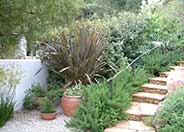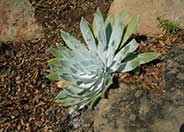
Common name:Yellow Moraea, Fortnight Lily
Botanical name:Dietes bicolor
This clumping perennial Iris relative stands 3'-4' high. It has light yellow, iris-like flowers with maroon blotches that are about 2" wide. It performs best in full sun and in soil with good drainage.

Common name:Red New Zealand Flax
Botanical name:Phormium tenax 'Rubrum'
New Zealand Flax is an excellent accent plant for the garden. Evergreen leaves are long, narrow, and grow upright. Clusters of flowers grow on spikes above the foliage in late spring and summer. 'Rubrum' is a large, bold plant with stiff, vertical, strap-like leaves that arise from its base and are dark purplish red in color. It should be grown in full sun.

Common name:Chalk Dudleya, Chalk-Lettuce
Botanical name:Dudleya pulverulenta
Chalk Dudleya is a succulent. with 12" diameter rosette and waxy leaves; it has interesting flower spikes.

Common name:Mexican Palo Verde, Jerusalem Thorn
Botanical name:Parkinsonia aculeata
The Mexican Palo Verde has prickly stems. This tree is very fast growing with sparse foliage and very long narrow leaves. Yellow flowers with orange red throats bloom sporadically. It is very messy, thorny, weedy and short-lived. This tree is usually found on limestone soils in areas with moisture but is strongly drought tolerant. It can withstand saline conditions. It can be cold or drought deciduous. It is beautiful in form being light and airy looking, with green bark.
Using Water Wisely
An efficient watering system applies the right amount of water to the right parts of the garden at the right time. This conserves water and saves you money.
Click in the green box for more information
| Designer: | Large Slab Steps Entry Walk |
Photographer: GardenSoft |
Soils and Compost:
Maintain a two to four inch layer of mulch on the soil surface to reduce weeds, infiltrate rain water, and reduce compaction.
Water Saving Tip:
Mulching and adding compost to soil can minimize evaporation and help soil absorb and store water.
Integrated Pest Management:
Develop healthy soil for plants that are vigorous and naturally pest-resistant.

